When my dad died, I wanted to sell everything, but my brothers said no, take something, so I took Delilah’s Skull.
My dad kept cabinets. Mostly at the hospital. Patient parts, he said. For research. Some cabinets contained bones – the odd compressed spine, tibias, broken ulnas. He had organs, too, slices of cirrhotic livers, a cadre of cancerous lungs, eyes in jars of viscous liquid. They rolled upward when you shook them. The only part he didn’t keep locked away was Delilah’s skull. That stayed at the corner of his desk at home.
It was hardly a skull, though. No attached mandible, occipital. Just the hard cap of parietal and frontal bone. I used to like to run my finger along the coronal suture.
Until he stopped smoking, my dad used Delilah as an ashtray. Butterscotch candies lived there for awhile, too. But I remember it best empty. When you could see the trace of blood vessels. They ran down the yellow sides, dried tributaries of ancient rivers.
Delilah was my dad’s cadaver. He grew up in this profession when bodies were easy. No one donated, so you just took. Still the act of taking unhinges most of us a little. Even my dad.
My dad used to pretend he went a little crazy because of the formaldehyde and phenol, but he admitted later that it was the act of unzipping the bag and seeing her face – its walnut gleam, its perfect symmetry – half-lidded eyes, a crown of red hair.
Like all of us, he tried to justify his act, looked for proof of her bad life…tattoos, needle marks, wounds. But, over and over again, the only violence he could find were the strikes of his own scalpel. And his thievery. The hunger of it. Taking the heart and lungs first. Then the ovaries. My dad said his partner tore into her abdomen, cracked her pelvis like a hungry drunk, and ripped her perineum.
My dad hated most when he cut her throat, removed the larynx. Gone the curtain of speech and song. He said he touched the ossicles of her middle ear and whispered, “Sorry, sorry.”
What happened when they cut into Delilah’s skull? How many coils and folds did they find in her brain? What decisions and indecisions, what forgetting, what remembering? My dad said that back then, they were in the habit of throwing all that away.
I am my father’s daughter. I save what I have not destroyed. Delilah’s skull remains in plain sight on my desk at the hospital. Sometimes a patient picks her up and holds her in the palm of a hand.
Once a nurse put condoms in Delilah. Another time someone dumped in chocolate hearts. As if she were a stain to be covered. Both offerings were cast out. No one understands. Nothing can appease the long dead.
Nan Wigington‘s work has appeared in Gravel, The Airgonaut, Sicklitmagazine.com, and No Extra Words. She has worked as an unclaimed property clerk, an accounting analyst, an ensemble actress, and a paraprofessional in an K-2 Autism center classroom.
